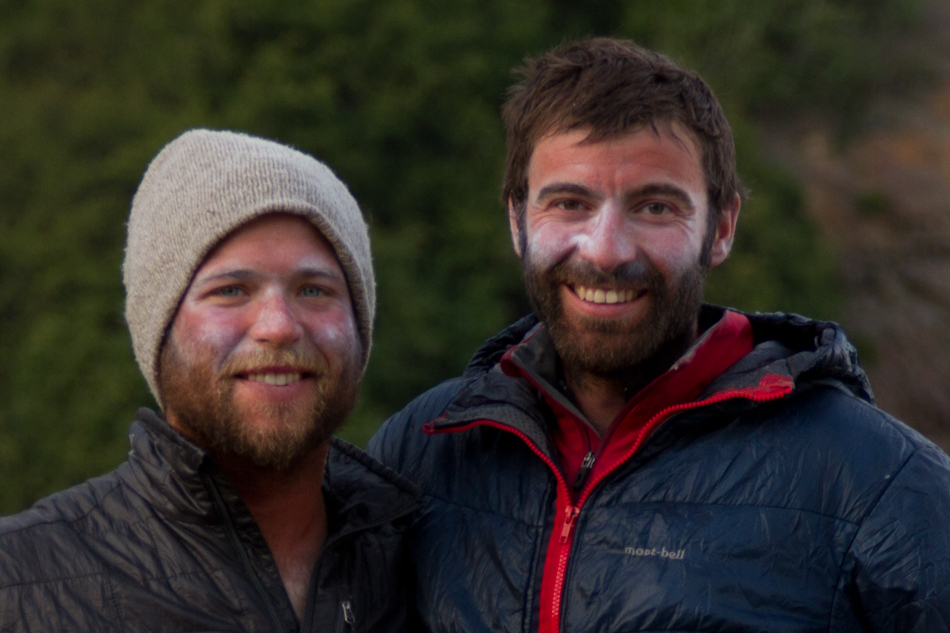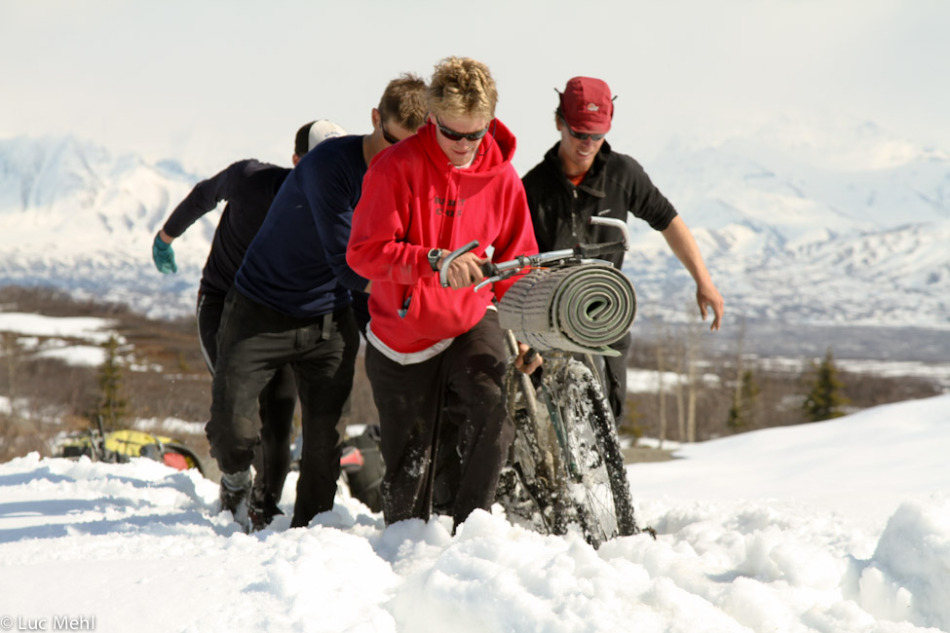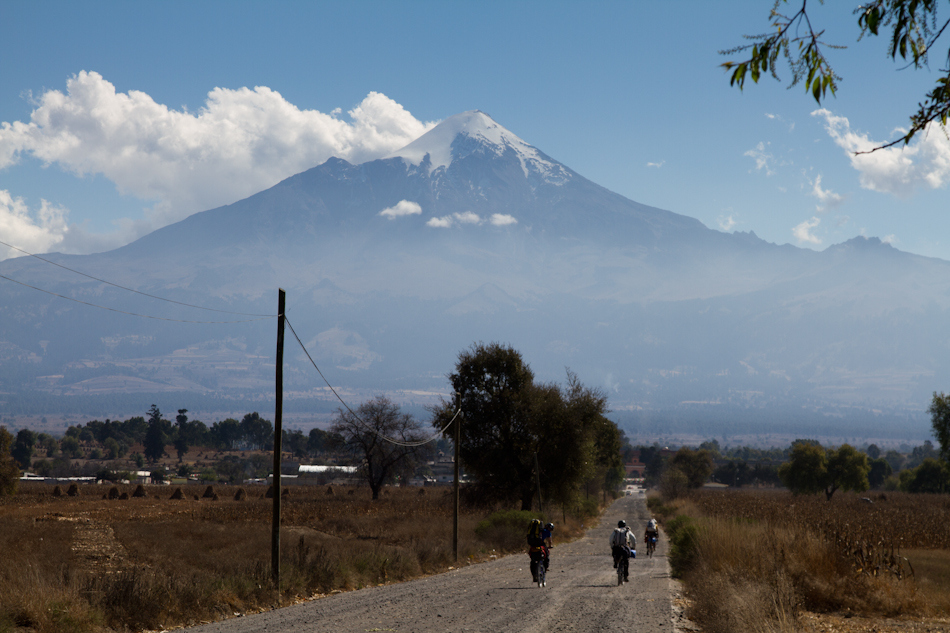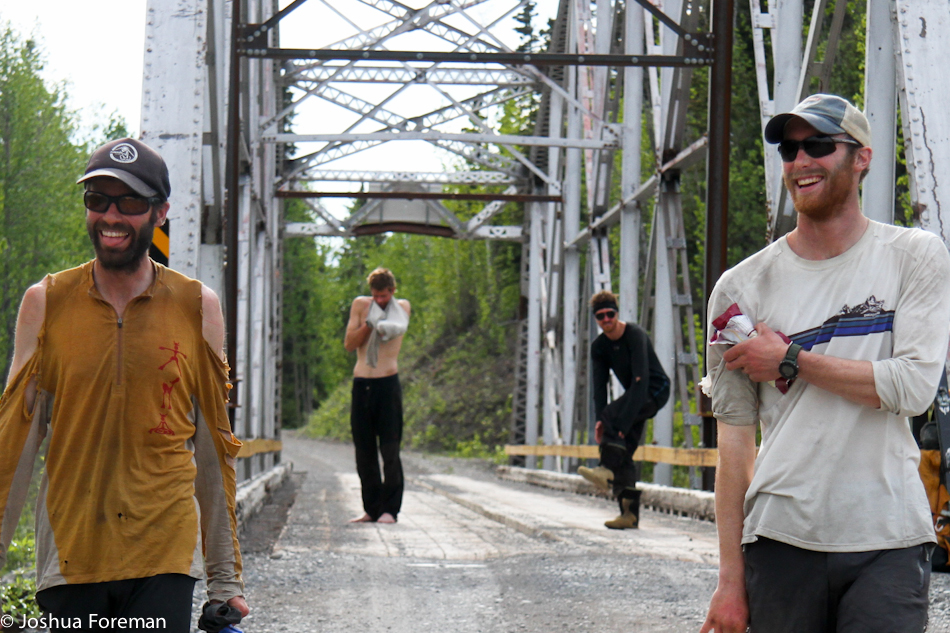
Luc Mehl (right) mid-way through a 200 mile ski and packraft trip. Photo by Danny Powers.
Luc Mehl is an adventurer in the truest sense. His deepest passion is to set a course across a tract of the Alaskan wild then cover it by foot, ski, packraft, bike, and even ice skate. He documents his human-powered traverses in great detail on his website through photography, video, and writing. For the past several years, his biggest objective was to complete traverses across North America’s three tallest peaks–Denali, Logan, and Orizaba–trips that took Mehl and partners across hundreds of miles of forests, desert, glaciers, rivers, and mountain peaks for nearly a month each time. In between, he’s done dozens of smaller traverses and many summer and winter Alaska Mountain Wilderness Classics, brutal point-to-point adventure races.
Bikes played an important role on two of his “Big Three” traverses, but Mehl is not a cyclist, per se (though he loves mountain biking and recently got a fat bike). Nonetheless there are universal themes of challenge, risk, reward and satisfaction in his adventuring that transcend modes of travel. I spoke to Mehl about growing up in the Alaskan interior and his early introduction to adventuring, the logistics of 30-day wilderness trips, what he gets out of his traverses emotionally and physically, balancing the very real risk of death with the rewards of his trips, and much more.
How did you get turned onto wilderness adventuring?
Probably the biggest things was growing up here. I grew up in a pretty small village in interior Alaska. It’s a little misleading to call it a village since it’s not a traditional native village. It’s was about half native. There are about 350 people there now. No roads. You have to fly in. Growing up there, I didn’t really know anything else. All the interior villages are river cultures–fishing along the river, boating in the summer, snow machine or dogs in the winter. We had a dog team growing up. That was just reality. We were living off moose meat and stuff.
When I went to college I studied geology because it was a ticket into the mountains. I didn’t get really into the sport aspect until moving back to Alaska after grad school. I finished one grad program and came home in 2003. Then I was only here for a year before starting another grad program. I didn’t move back for real until 2008. That’s probably when the clock started in terms of doing higher-profile trips.
Did you ease into it with day long ski tours or long hikes and build it up, or did you just straight in to multi-week trips?
I definitely built into it. I think the building started in high school. We were doing short trips and making mistakes and learning from them. I remember my first backpacking trip in high school I carried two quarts of liquid milk. I could maybe drink two quarts of milk right now if I was trying to gain weight, but why would you bring that on a weekend trip? I was just totally clueless. I had this little tarp and PVC structure for a tent. I didn’t have money for a tent so I built this thing out of Army surplus store supplies and it totally sucked. I definitely went through some learning curves in high school. Then a lot of my geology work was in awesome terrain. I got to go to Norway, Greenland, Iceland, Svalbard, Nepal. That was more learning and carrying heavy weight.
When I moved back to Alaska I got serious about learning to ski and bike. I got a pack raft. My high school friends were doing that kind of stuff so I needed those skills to hang out with them on the weekends. I was borrowing gear from them for the first couple of years.

Biking through Denali National Park is a team effort. Photo by Luc Mehl.
Was there any one big trip that sparked your love for this, that set you towards doing what you do now?
There were a couple. I had one trip in high school where we went down to Utah. It was a backpacking course. I didn’t really recognize it as a changing point, but my mom talks about it still. I came back from that trip and she was like like, “whoa, what happened?” I was 15. I think I identified that I was good at it. I was good at scrambling on those rocks. It didn’t bother me when it was wet and cold. I just really enjoyed who I was in that space. That was probably the first sort of trigger.
Then back in Anchorage there was a one day, multi-sport adventure race called Hammer. They don’t do them anymore. I did that with two good friends that I’d learned how to ski with. I think it was 60 miles and it just wrecked me physically. I was crushed. But we did really well. It was super fun. And our dynamic as a team was great. You can probably relate at some point in your recreational past to having a posse you can completely rely on. We didn’t check in on Friday night, we just knew we were going skiing or mountain biking on Saturday morning. I had these guys for a few years where it was just the three of us every weekend. In the race we had that same dynamic of friendship, but being maxed out physically was an eye opener. I thought, I want to do more of this. One of those guys had done a few of the Wilderness Classics. He convinced me to get on board for a Winter Classic and that was really the trigger for the big trips. After doing quite a few Classics, I started feeling like I was smart about how to do those, so we started applying that mentality to bigger mountain trips in Denali and stuff.
What inspires you to tackle these monster, human-powered traverses? What do you get out of it?
I think probably the biggest thing is the sense of accomplishment. But ultimately that’s not enough motivation. I don’t think anybody’s motivated to do something just because they know they’re going to feel good at the end. I’ve always been really visual, I love the landscape. It was part of why I was doing geology. Really the reward is to see as much of the landscape as possible. I’m all about one-way trips. I’m never as motivated for an out-and-back. Even if it’s a two hour trip, I’m like, ugh is there any way we can find another trail for the way back? I don’t want to turn around, I want to see more of the landscape. That combined with the social dynamic of incredible partners and the physical dynamic of being challenged and putting my skill sets to the test. That’s probably the three legs of this stool I’m trying to put together.
It seems like with any endurance athlete, finding that limit of human physical ability is part of the appeal. Have you found that physical limit or failed on a trip because it was too physically ambitious?
I haven’t failed. But I’ve definitely reached the limit of ambition that I want to reach. The Logan trip we did was really hard. I’m really proud to have accomplished it. We all are. But man, I don’t ever want to do anything that hard again. That’s actually really nice, because it’s made it really easy to say, “that’s not really terrain I’m going to feel comfortable in,” whether it’s a day trip or two weeks. I don’t have anything to prove. I don’t want to push it that hard. Physically, pretty much every one of those Wilderness Classics has pushed me to my physical limit. They’re devastating. And on the backside of that, they’re hugely rewarding.

In their element on the Denali Traverse. Photo by Luc Mehl.
Tell me about the planning and preparation for a month-long trip.
We have a pretty good system at this point because it’s the same core crew on these trips. The first stage of the planning will start probably six months ahead or even more. Generally that’s getting on Google Earth and drawing potential route ideas, saving those files, then passing them back and forth with everybody in the group. We just collect information. Someone will say, “oh, I talked to a pilot who flew over there and said it was cracked up” or “this place has a big gravel bar” or whatever. It all gets built up into this Earth file. Cabins, bail out points, options all get drawn on there. By the end of this planning stage, when we’re about to go on a trip, we’ve got that route dialed into one intended route. That route goes directly into our GPS. Now we’re pretty much just using iPhones. So we’ve got that route in hand and don’t do much navigating while we’re on the trip because we’ve got that intended route and stick to it pretty closely. Especially if the satellite imagery was good in that area because we’ve done all our homework before hand. So that’s the planning, the fun part. We also have some sort of shared doc like a Google Doc for the logistics stuff. Who’s going to bring what food, fuel, stove, who has what gear. Here’s a bunch of pilots phone numbers, etc.
How often have bikes factored into the adventures?
I think just on Denali and Orizaba.
Why’d you use bikes on those trips?
Definitely the main objective was to be human powered. Beyond that it was about covering as much ground as efficiently as possible. Whenever it was possible, we’ve brought bikes. It wasn’t an option on Logan because we weren’t on any roads. But for Denali we were like, “oh yeah we can hammer out this 50 mile section on bikes.” And it worked in Mexico because we were on the road system a lot of the time. Definitely I’d be using them more if we were doing more road-based trips. I love biking. Maybe now that I’ve got a fat bike I’ll be pulling them in more. But they’re so heavy. This trip in March will be a good test to see how much I like pushing a bike.

Biking to Orizaba in Mexico. Photo by Luc Mehl.
Tell me about that upcoming fat bike traverse.
It’s going to be on the Iditarod Trail. It is still wilderness, I guess, but it’s on a trail, which is new for me. It’s actually making it hard to plan. I have a really good sense of how much ground we can cover on various types of wilderness terrain. But on a trail it’s like, huh can we go 50 miles a day? Is that reasonable? I just don’t know. It’s kind of fun planning a new trip. It’s a sweet trip for me because we’re going to start in McGrath where I grew up and bike the Iditarod Trail back to Anchorage. I want to just go door to door from the house I grew up in to the house I own in Anchorage. I’ve got a couple friends from these other friends joining me. It’s a big group of eight right now.
Does everyone who’s into cycling in Alaska own a fat bike at this point?
Not everyone, but man, there are more fat bikes than any other bike that I see all winter in town. This year it seems like there was a major regime change. I think when the entry level bikes, the Salsa and the Pugsley and those hit the $1,500 mark, it made a huge difference. That’s what it took for me. I needed that lower price point.
What do your parents think about your adventuring? I know a lot of parents worry, especially when their children (even adult children) are gone and out of communication for long periods of time.
My mom gets it. She’s fully on board. It kind of amazes me. I don’t fully understand why she understands me so well. But she just sees how much I thrive on those trips and how important they are to me. We moved to McGrath to be with my step-dad. Maybe she can relate to the wilderness aspect of it. Or maybe she can relate to the physical aspect, she used to be a dancer. She’s dropped a couple pretty incredible insights. Both of the grad programs I was in I quit early. I was on a PhD track and decided to just leave with a masters. Both times mostly because I was so anxious to get home to Alaska. The second time, she said something like, “if anything ever happened to you on one of these wilderness trips, I would just be so grateful that you got out of MIT.” My dad is down in Montana and I didn’t grow up down there. I don’t think he understood me leaving MIT. I’d imagine that was a huge disappointment for him because I was on this prestigious track, or whatever. But my mom was there. She got it. She was like, “oh yeah kid, you gotta get out of there. Go get beat up in the mountains because that’s what you need.”
Last year, my friend Rob Keher died during the Classic. That hit me really hard. It hit everyone. I’d been traveling with him just days before. I was working through that loss and my mom was working through that one for me. I don’t remember exactly what she said, but it was something like, “if i had the power to prevent Rob from putting himself in that situation, would I?” And she said basically, “no. I do what I do with you. I let you go because I know how much it means to you.”
Before my first Classic, I wasn’t working. I’d just moved home from that grad program and hadn’t found a job yet. I was in really good shape because I was skiing every weekend. But I didn’t have any money. The Classic only costs $150, which is crazy cheap, but i just didn’t have it. I went to my mom and was like, “I’m in the best shape of my life, I really want to do this race, will you spot me?” And she did it. The next year, you’d think by then I would’ve had a job, right? But still I wasn’t really working. But I was in even better shape so she spotted me again. It became this ma and pa fund where they paid my entry fee for the Classic every year.

Luc Mehl (left) looking emaciated at the end of his 30 day Logan Traverse. Photo by Joshua Foreman.
In that vein, how do you balance the risks of your trips with the rewards?
I’ve thought about it a ton. Especially since this year, losing Rob. It was a bad year. Rob was the one I knew best, but there were other guys I’d been with in the mountains who died last year. Jim Harris broke 10 vertebrae in his back and is learning how to walk again. This year I’ve spent a lot of time thinking what the hell are we doing? This winter there’ve been so many avalanches already in Chamonix. A guy died in Anchorage, a student at the university. I’m definitely getting this message over and over again of “why are you putting yourself out there?”
I think a lot of the insight I have about it actually came from talking through stuff with my mom and her take is now sort of my take. I could definitely function fine without these wilderness trips. But I wouldn’t be the Luc that I want to be. It’s easier for me to talk about it in terms of Rob. Rob definitely could’ve been the same youth counselor that he was, or the same husband. Could’ve fulfilled all those roles. But he wouldn’t have been the Rob he needed to be. He needed to do those Classics. They were so important to him that they were in his wedding vows. There was this lifestyle commitment. The risk was so great that he lost his life for that. And of course that doesn’t seem fair. But he needed those trips. Even knowing that. He was afraid of water from the get go. He used to wear a PFD on the beach in Hawaii. It was awesome. He was such a good character. Part of why I was hit so hard by his death was that, even though we were so different, we had that in common. I need those escapes, too.
There’s something about validating your skills. Learning to control a bike in the air. Learning to ice skate. When it all comes together on a trip it’s so validating. I’m like, yeah, this is where I’m supposed to be. I thrive on that. I can hold on to that for a long time before I need to recharge the battery. That was kind of a rambling answer to a tough question. I don’t know if you got what you needed out of that.
Yeah, absolutely. I didn’t have one answer I was looking for. It’s something I think about as someone who goes into the backcountry on ski tours and on (much smaller) bike trips.
You just qualified your trips versus my bigger trips and I don’t think you need to make that distinction. It’s all completely scalable, at least the way I’ve been thinking through this. A friend introduced me to studies by a psychologist Csikszentmihalyi. His specialty was studying this relationship between challenge and skill. He did it with athletes, artists, professionals, parents, people across the board and tried to quantify the evolution of the fields in that space. He has this sweet spot that all of those fields have in common that he calls flow. It’s high skill, high challenge. For our generation people would say, “he’s in the zone.” It’s where you can kind of go mindless. You’re not over-rationalizing everything. Your body just knows what to do. When you’re body’s doing that instead of your mind and you are using this advanced skill set and matching it with an advanced challenge, you’re in a state of bliss. I think it’s totally the same thing with writers when they’re like, “I float away and the writing just happens” or musicians when they’re creating new music. There is that sweet spot. If you go into something that’s too hard and don’t have the skills for it, you’re in a state of anxiety. If you go into something that’s too easy and you’ve got too many skills, you’re in a state of boredom. There’s this sweet spot of flow that I think you can jump in and out of as you build your skill set. It’s an evolution we all have, whether learning at the university or learning in the backcountry.
You’ve said you’ve got nothing left to prove after the Mt. Logan traverse. If it’s not about finding your limit anymore, what do you still want to accomplish with your adventure “career?”
Mostly to pull in more landscape. I want to see new places. That’s the big one. Both my main trips this spring are going to be going to new places or filling in gaps. I’ve seen areas around them, but haven’t connected them. The bike trip going from home to home–I know that McGrath area and I know the Anchorage area. It’s going to be really sweet to connect them. The other one, our ski trip, is going to be closing a gap between Valdez and Anchorage. I’ve skied quite a bit to the east of Valdez and quite a bit to the west of Anchorage, but I have this missing zone. Hopefully we can get that done this year and then I’ll have completed this whole coastline section. Then next year I can work my way down to the southwest or southeast and keep picking up new landscape chunks.
Like what you read on The Bicycle Story? Support the work with a donation, by buying a shirt, or sharing it with your friends.


3 Responses to Luc Mehl: Life, Death, and Philosophy in the Alaskan Wilderness